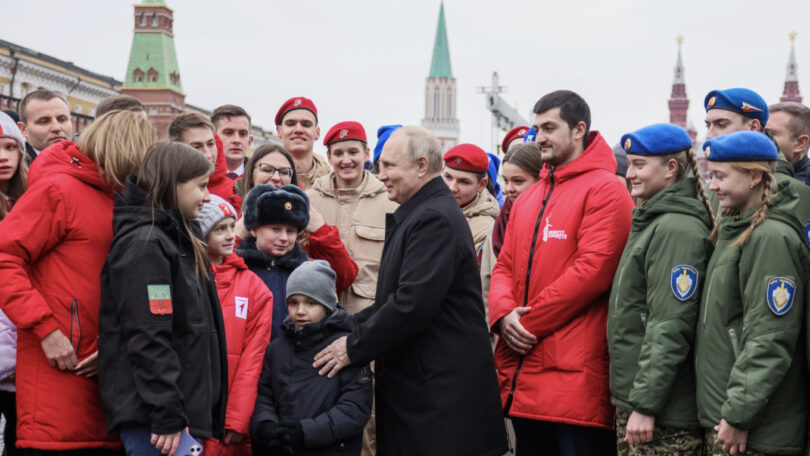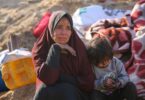Alexander Finiarel
For the first time since mobilization was announced in September 2022, all three independent Russian pollsters showed a sharp decline in public support for invading Ukraine. This time, the drop in the level of support for the war is not related to any specific event, and may even indicate a turning point in Russians’ attitudes toward the “special military operation.”
According to a poll published on Oct. 31 by the Levada Center, the share of Russians who favor continuing the war has fallen 11% since last month to 37% – the lowest figure since mobilization was announced in September 2022. Fifty-six percent of respondents were also in favor of opening negotiations with Ukraine. The Russian Field service corroborated the Levada Center’s findings by publishing its own poll results on Nov. 15. Almost half of Russian Field’s respondents were in favor of opening negotiations and 39% were in favor of continuing the “special operation.” A June poll by the same organization was roughly evenly divided.
In addition, the number of people who believe that Russia is moving in the right direction has fallen by 8% and the number of those who believe that the “special operation” is going unsuccessfully has grown by 4%. Furthermore, the share of those who do not trust official information about the course of the war has for the first time exceeded the percentage of those who trust it. Finally, a Chronicle Group poll conducted in October 2023 reports the lowest level of support for the “special operation” since the fall 2022 mobilization, with 51% of respondents then and now indicating support. Moreover, for the first time, the share of people who would support a decision from President Vladimir Putin to withdraw troops without achieving Russia’s strategic objectives fell below those who would oppose it. The percentage of people not ready for a truce also fell from 47% to 32%. The number of people who prioritize spending on the army fell from 37% to 25%.
The last time all three pollsters showed a decrease in support for the war was during the mobilization period. However, support recovered as soon as it ended and people realized that the war still did not directly affect them. Unlike in September 2022, when Russians were reacting to mobilization, support for the war is falling for no apparent reason. Even though Ukraine’s counteroffensive has failed to achieve meaningful results, the Russian army’s mounting losses and lack of territorial gains do not increase Russians’ confidence in victory.
Moreover, the uncertainty of the period for which the mobilized were taken to war, combined with the authorities’ false statements that the mobilized would serve far from the front line and not take part in battles, is increasingly irritating their loved ones – whose share, according to Chronicle’s calculations, comprises about 10% of the population. On the mobilization’s first anniversary, they started to flood MPs with letters and even tried to protest. In both cases, these changes are not due to an increase in the number of people calling for peace (which is practically unchanged since February), but rather the decline of those actively calling for war. According to Chronicle, these core supporters have shrunk to 12% of the population, meaning they are now outnumbered by core opponents of the war (18.5%). The same thing happened in the fall of 2022. Russian Field polls first pointed to this trend in the summer of 2023. Back then, loyalists ready to support any of Putin’s decisions no matter what grew in number by 8% mainly due to the reduction of people who were willing to support any decision except signing a peace agreement).
As a 1998 study showed, the 18-month milestone is an important turning point when the initiator’s chances of victory drop significantly. They analyzed the relationship between a country’s political regime, the duration of the war it started and the probability of victory to see how their likelihood of victory faired over time. According to their calculations, if a democratic country starts a war that lasts less than a year, they have a 49% chance of victory. However, if it lasts a year and a half, that probability drops sharply to 19% and continues to fall as the conflict’s duration increases. The same trend, although less pronounced, is found among autocracies. In the first year of a war, there is a 32% probability of victory. After a year and a half, these odds drop to 27%, and only fall by 2% after that.
Democracies see a sharper decline in the probability of victory because they are more sensitive to public opinion. Autocrats are less careful in choosing conflicts and more likely to lose them, precisely because fewer people are involved in the decision to go to war. But because a large part of the population cannot influence policy, they care less about public opinion – and are thus more likely to persist for longer. As political scientists Chigdem Sirin and Michael Koch pointed out in their 2015 study of the impact of war losses on the sustainability of dictatorships, autocrats only need to protect the most important political groups from the hardships of war. This is clearly visible in Russian polls, as support for the war correlates with respondents’ age and financial status. Despite record low unemployment and reformed social benefits, 44% of respondents in Chronicle polls report a decline in income since February 2023. In the most recent Russian Field poll, the share of people who support the war and a new round of mobilization only outnumbers those who don’t among high-income earners.
In the absence of a breakthrough, Russia will likely see a further decline in support for the invasion of Ukraine, even if it does not experience a significant defeat on the battlefield. The only question that remains is whether passive discontent with the war will turn into active discontent and whether the anti-war movement will be able to capitalize on it in the run-up to the presidential election.
The Moscow Times







